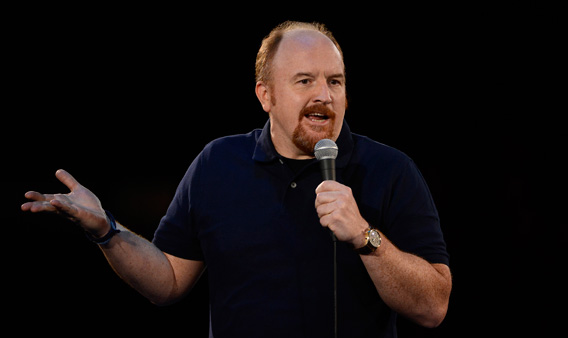Louis C.K. is basically no better than that homeless guy who whipped his dick out and started yanking it in front of you that one time when you were leaving the subway. That assessment’s based on this New York Times report, in which several women allege he’s done just that in private and without permission.
If you think about it, that homeless guy, admittedly one of the reasons visiting New York can be so memorable, was also morally superior to C.K. in a couple of ways. He didn’t falsely market himself as a caring, humorous feminist who loves his daughters and supports female comics. The homeless guy also had the decency to do what he did out in the open, while C.K. did the exact same thing behind closed doors.
The day’s not over and so far two stories have come out about high-profile men who had sexual encounters with teenagers or groped women. There was a third story, the long-anticipated Times piece about Louis C.K. and his penchant for masturbating without warning in front of women he works with.
After what has become landmark reporting on Harvey Weinstein’s equally repulsive behavior, a floodgate opened. It feels like almost countless women (and some men) have come forward to expose deeds that powerful predators had expected to remain in the dark. These are politicians, celebrities and leaders in their chosen industries. Still, the pitch-black allegations that have spewed from Pandora’s box have a darker side.
You could boil it down to the #metoo hashtag, a movement where women posted about sexual assault or harassment they’d faced, but that feels like just a start. These things happen to so many women, but the flipside to that is the sheer number of men who are never held accountable for their actions. There’s a regularly cited statistic that 1 in 5 women is raped during college. There’s no statistic to show how many men are responsible for that, and sexual misconduct is so underreported that we can’t rely on the number of convictions or police reports to get a clear picture of how widespread this problem is.
I learned about the rumors regarding C.K. just a few weeks ago, even though there are reports on his bizarre behavior going back several years and Tig Notaro also notably had a falling out with C.K. because of his now renowned perviness. C.K. obviously continued to work and garner respect despite the open secret, and today’s New York Times story suggests his manager worked to protect the comedian’s reputation.
But – understatement – today’s report was so disappointing. To me, C.K.’s comedy, shows, writing and all-around persona showed that he respected women. I rejected criticism that a scene in “Louie” was downright rapey, because I saw what I wanted to.
We all see what we want to see. But most of us aren’t celebrities, and the questionable behavior we ignore or let go or shove into our subconscious is not a celebrity’s bad behavior. It’s the actions of people we know, who we’re close to, who are in our families, who we work with or go to church with or invite into our homes.
I’m not by any means trying to say that every man is a predator, because I simply don’t think that’s true. But I firmly do believe that sexual assault and other forms of misconduct are common enough that we shouldn’t be appalled by the slew of accusations making the news right now. We should instead be appalled that it took so long and that there are victims in our own lives who are afraid – terrified – to speak out.
In college, one of my friends raped me. It didn’t make sense. After more than 10 years it still doesn’t make sense, because like with C.K., what he did conflicted dramatically with how he had represented himself. He was a peace-love hippy type who decried all forms of sexism and racism and oppression. Your garden-variety social justice warrior. Sexual assault didn’t jibe with anything I knew about him, and I thought that I did know him.
Maybe that’s part of the problem for those of us who don’t report crimes like these. We want the version of the person we knew before they did something terrible to us to be real instead of this sham of humor and generosity and empathy. Moreover, even if you know someone is capable of sexual violence, if someone maintains a stellar reputation, it can be daunting as hell to challenge that. I couldn’t begin to negotiate what my friend had done with who I had thought he was before the rape. How would anyone believe me?
I never reported what he did to the police and I didn’t tell anyone what had happened for weeks.
The #metoo hashtag opened dialogue, but we need to take another step forward. How can we show women that we believe them and acknowledge the pain of what they went through? How do we foster a culture where victims speak up immediately without fear of being called a liar or a slut or putting their own reputations and careers at risk? Most importantly, how can we teach men that sexual violence is an unacceptable crime that has consequences, like any other crime?
I have no answers. What I do have is a growing scroll of names of powerful men who are learning about those consequences.
Contact Mollie Bryant at 405-990-0988 or bryant@bigiftrue.org. Follow her on Facebook and Twitter.

